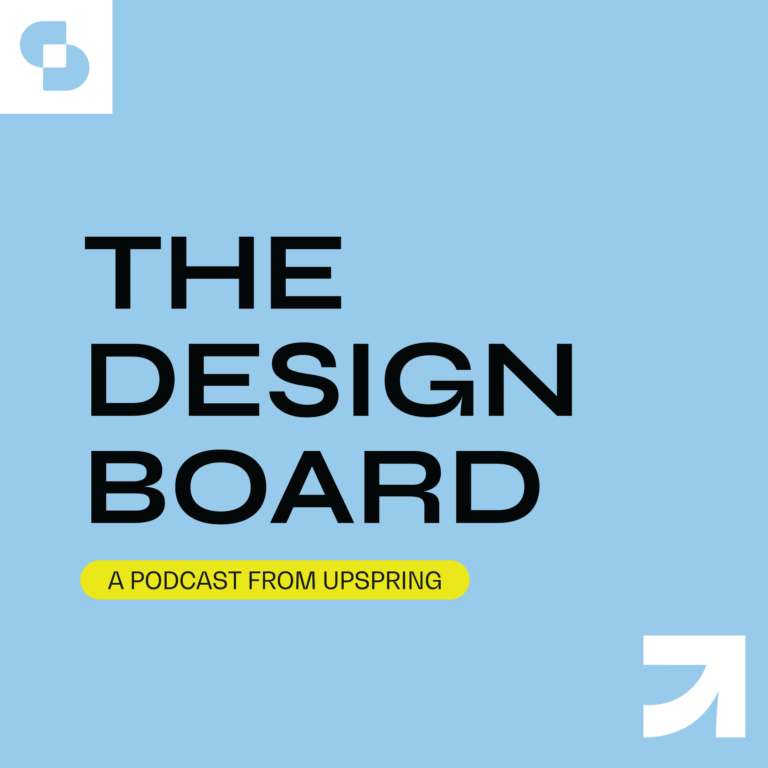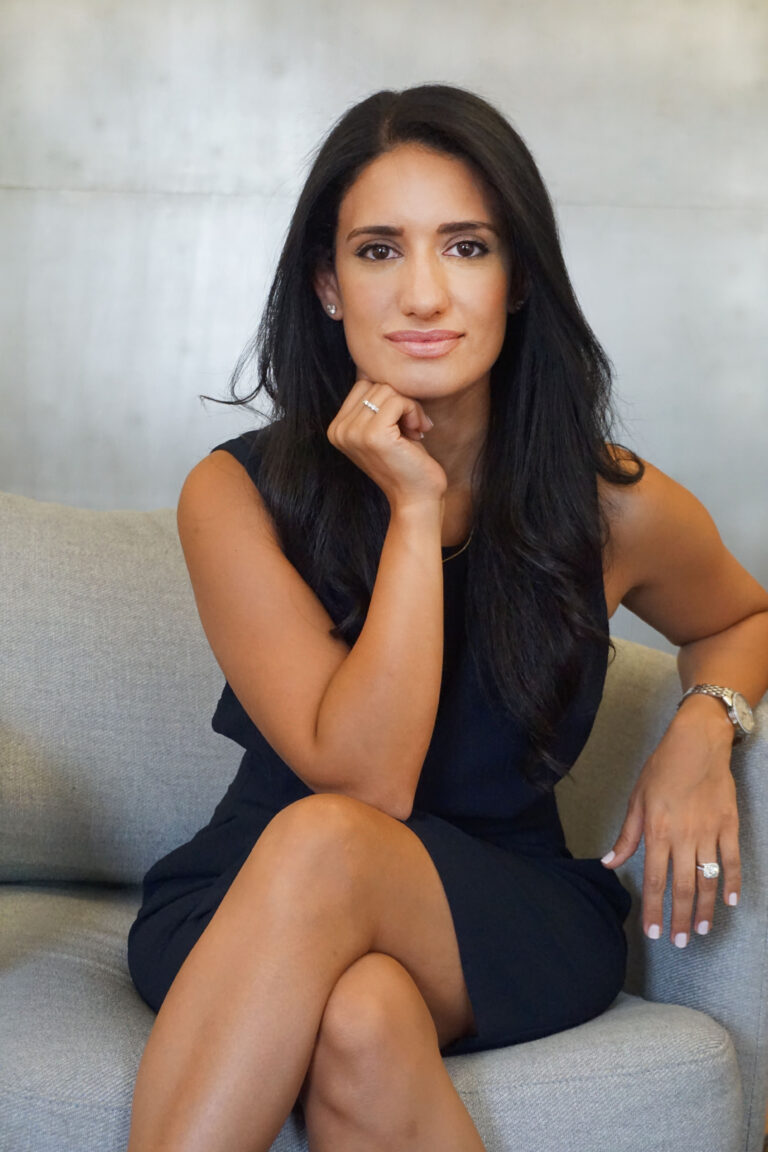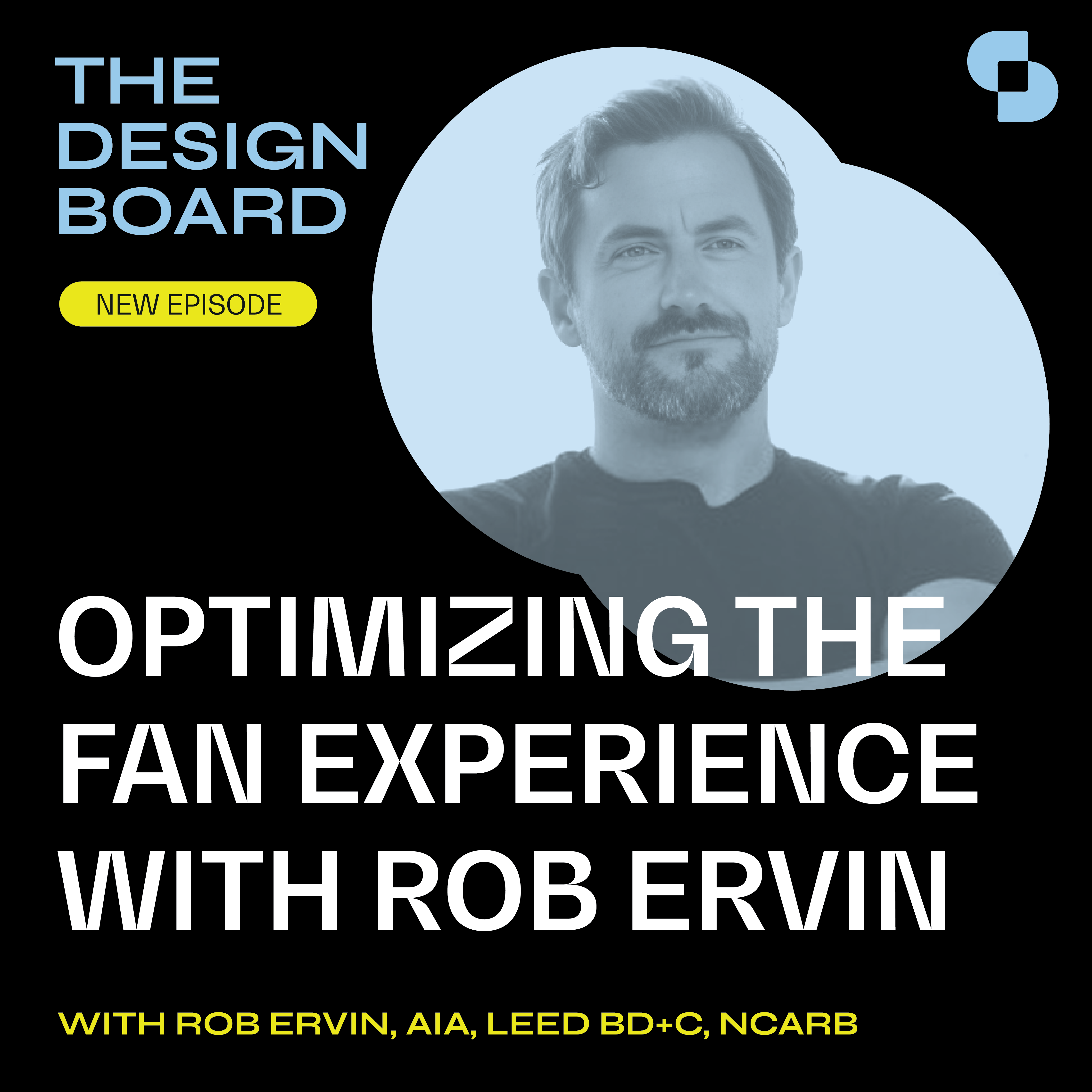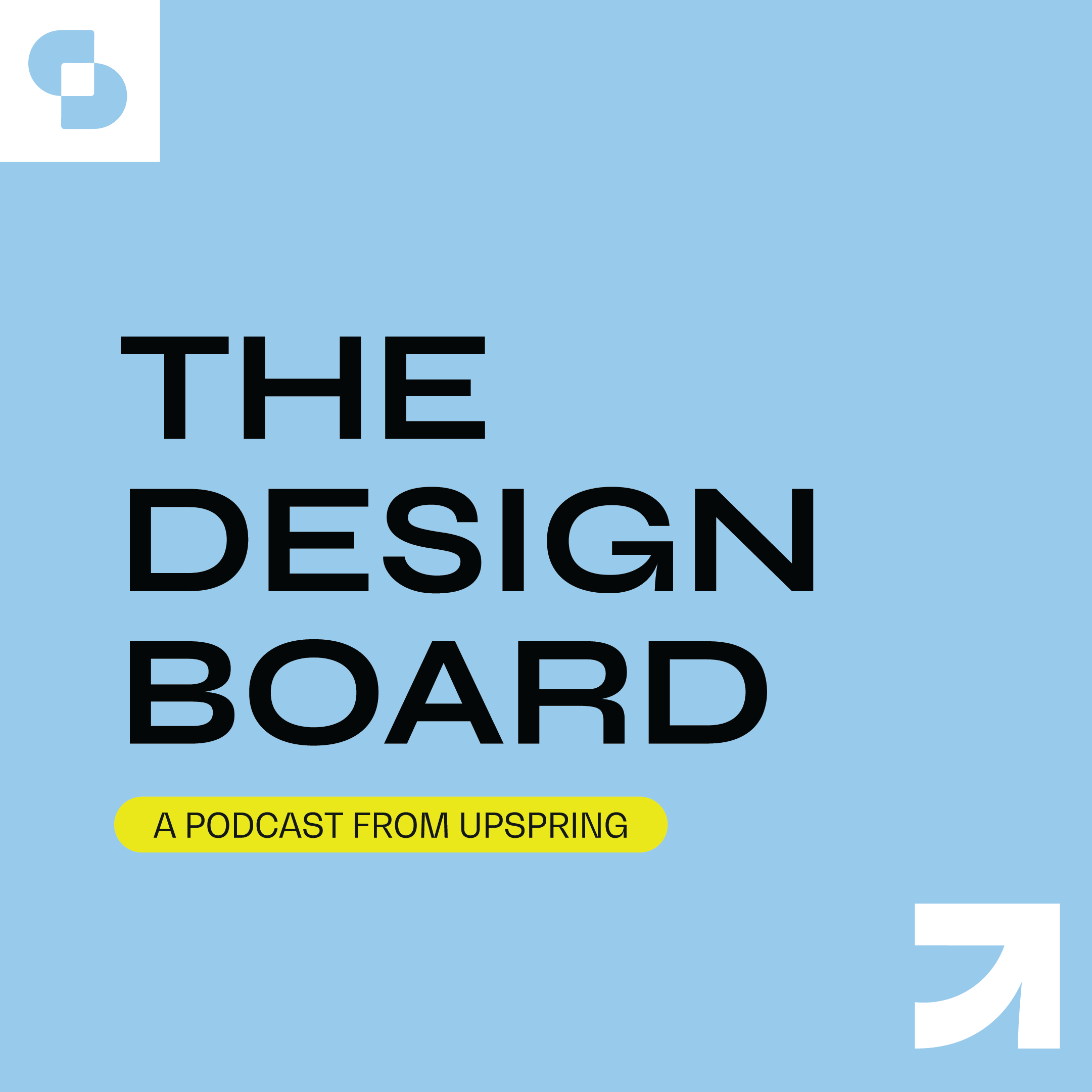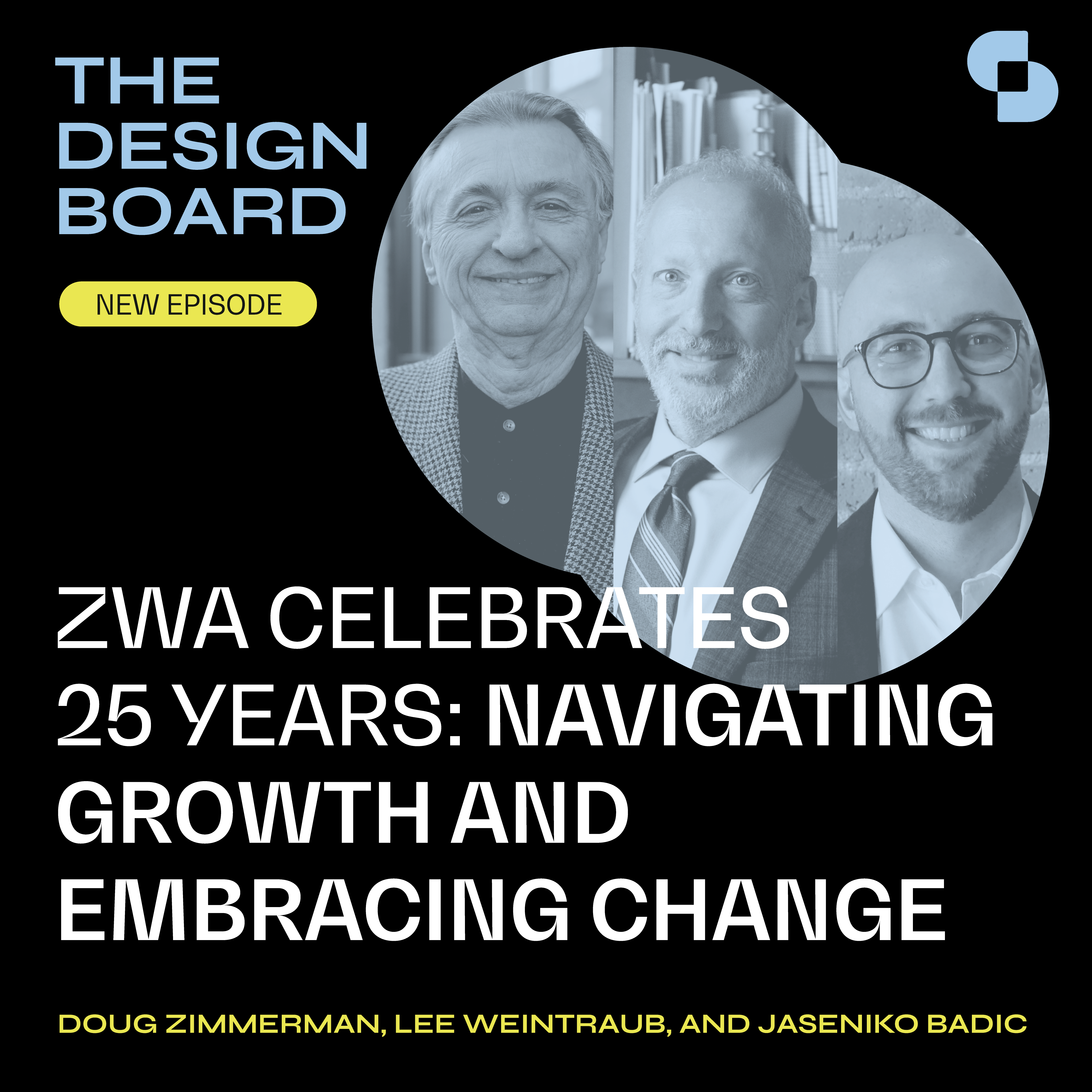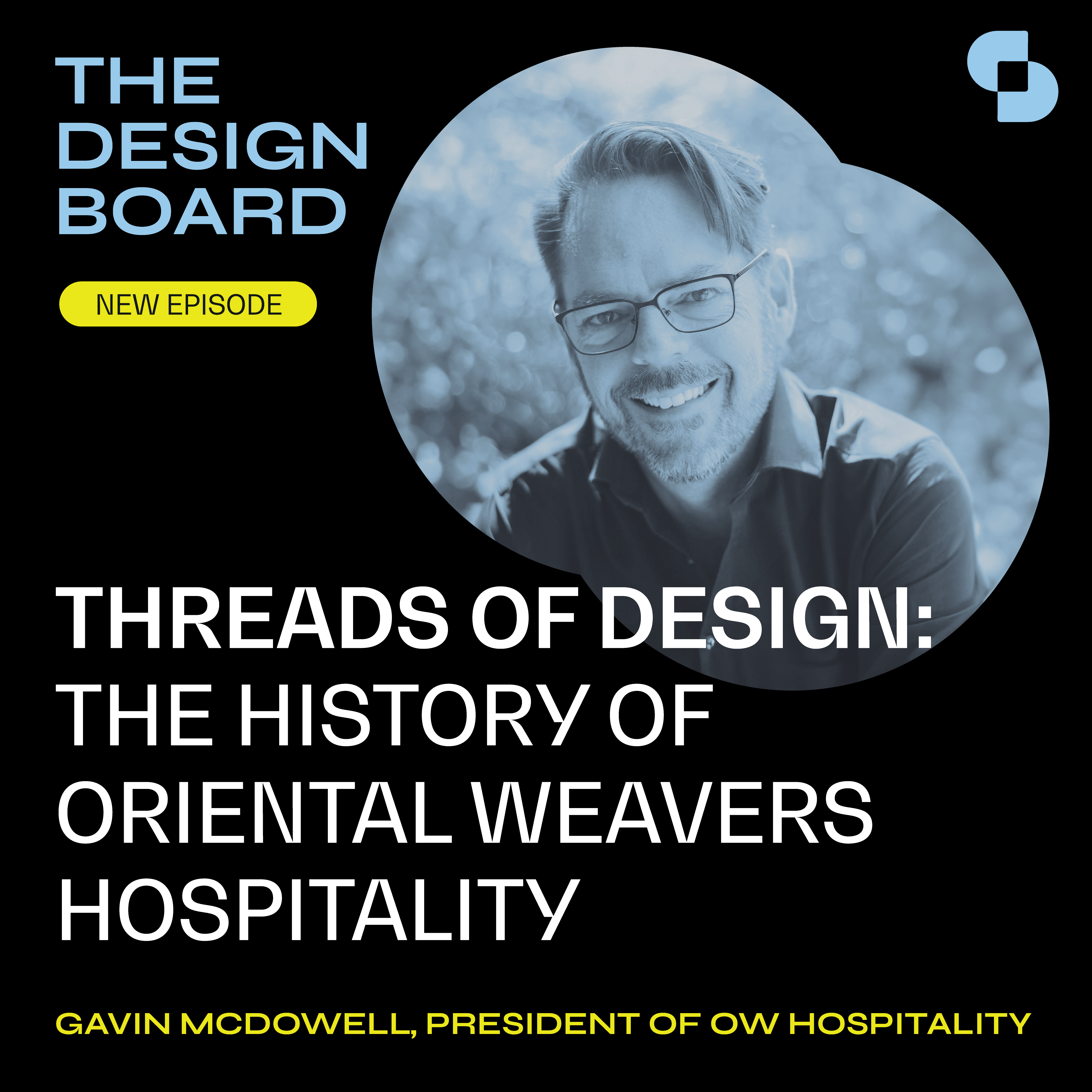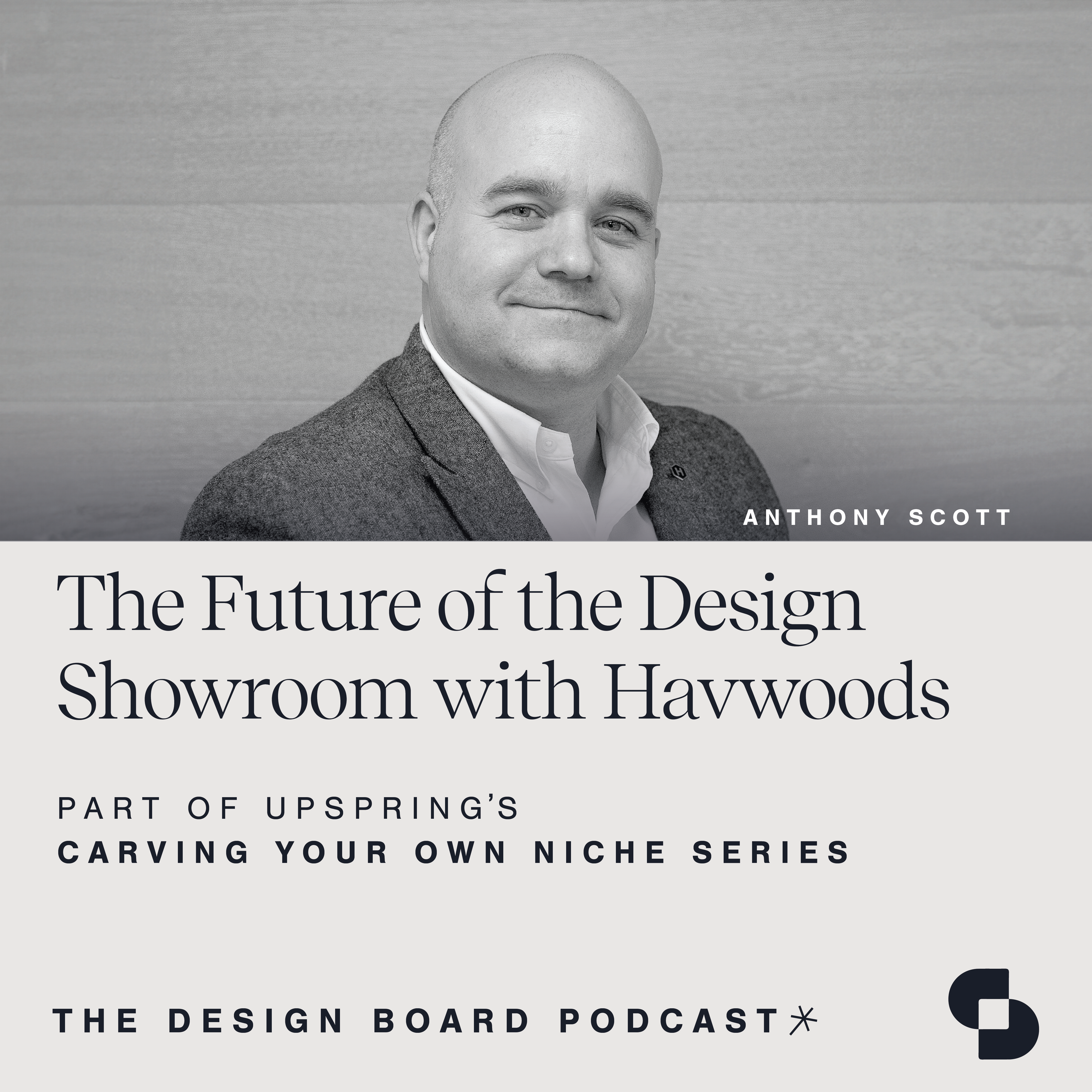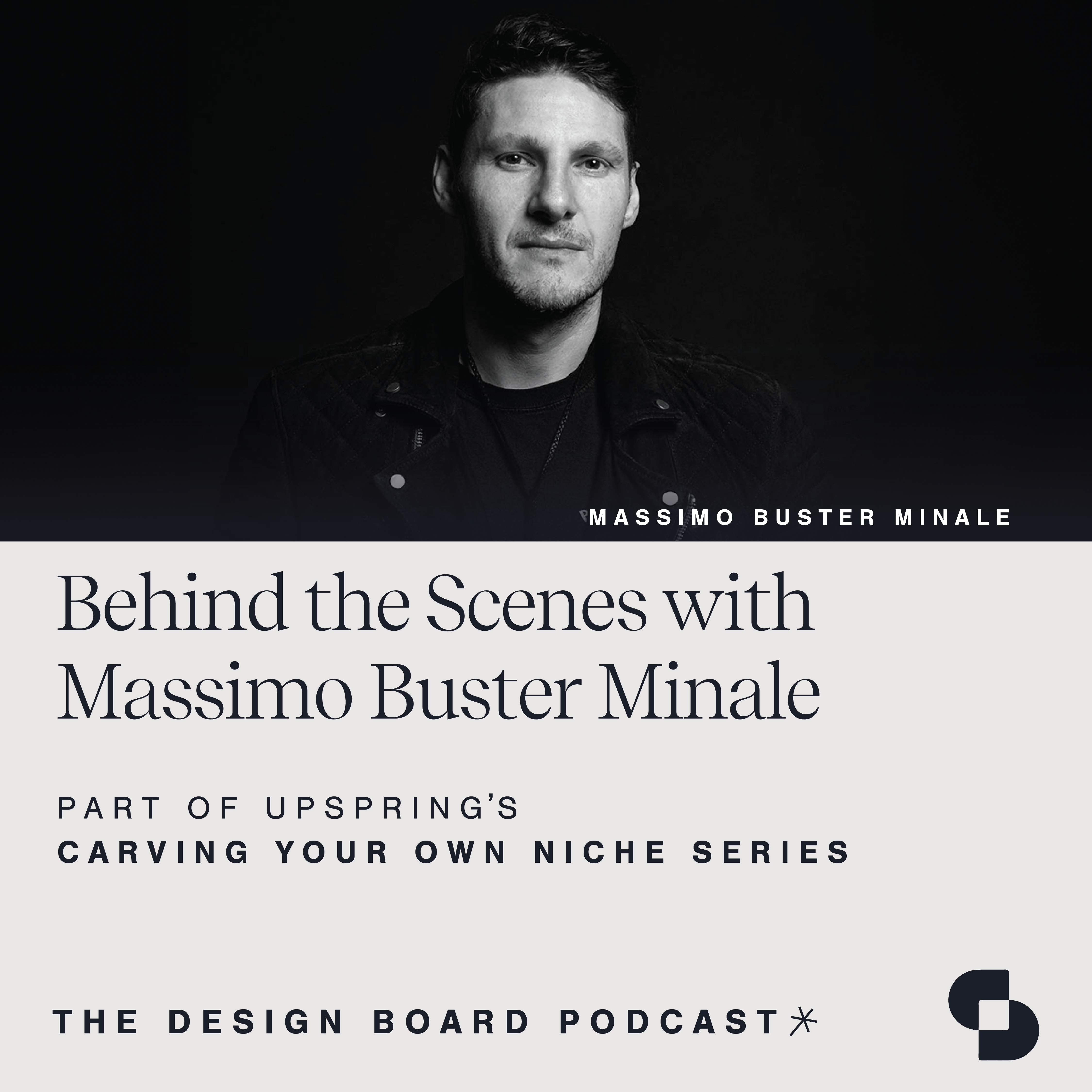Host Tiffany Rafii sits down with Hector Sanchez, CEO of Premier, to discuss leadership tips and tactics for fostering a positive company culture and collaborative environment for architects and interior designers.
The Design Board, by UpSpring, is a proud member of SANDOW Design Group’s SURROUND Podcast Network, home to the architecture and design industry’s premier shows.
Although the transcription is largely accurate it was generated in part by an automated service. In some cases it is incomplete or inaccurate due to inaudible passages or transcription errors.
Tiffany Rafii: Welcome to The Design Board, a podcast created by the team at UpSpring that focuses on design, development and everything in between. We invite innovators in our industry, and explore topics that support your growth in every way. The Design Board is a proud member of SURROUND, a podcast network from SANDOW Design Group, featuring the architecture and design industry’s premier shows. Check it out at surroundpodcast.com.
Welcome everyone to The Design board, a podcast by UpSpring that focuses on design, development, and everything in between. We host innovators in our industry, and explore topics that support your growth in every way. I’m your host, Tiffany Rafii, CEO and co-founder of UpSpring, and I’m joined by an incredible leader in the hotel and multifamily industry today, Hector Sanchez, CEO of Premier.
Today, we’re going to talk about creating a cohesive team dynamic that fosters growth and collaboration among various positions, from senior management to associates. Hector leads Premier, an end-to-end architecture, design, procurement, project management, and development firm, headquartered in Dallas, Texas. With all services yielded under one entity, Premier’s team is in constant pursuit of finding innovative solutions to the hospitality and multifamily industries’ increasingly complex problems, from straightforward soft goods refreshes to transformative custom design renovations. Since joining Premier as CEO during the pandemic, Hector has taken great strides to rebuild Premier and lay the foundation for future success. The firm has expanded into the third party market, and was awarded 30 contracts following Sanchez’s initiatives. In addition to its strong presence in hospitality, the firm serves the multifamily and student housing markets and is looking to expand its reach across more sectors.
Thank you for joining me today. I’m so excited to delve into this conversation.
Hector, thank you so much for being with me today, we’re really excited to have you.
Hector Sanchez: Thank you. Thanks a lot for having me, Tiffany, I’m very, very excited to be here with you today.
Tiffany Rafii: Awesome. Let’s dive in. So first off, I wanted to congratulate you for being named Dallas Business Journal’s Most Admired CEO. I started working with you in 2021 when you first joined Premier, and noticed how quickly you turned the company around. Premier has grown considerably, in fact, Interior Design Magazine ranked Premier number two in terms of firms with the most fee growth from 2021 to 2022. I’d love to start this conversation with your perspective on strategic tactics for growing a company and building a cohesive team dynamic.
Hector Sanchez: Great. Well, thank you very much for having me on the podcast, Tiffany. Definitely an honor to be recognized by the Dallas Business Journal on that award. However, I think it just makes it a lot easier when you have such a great team around you, so definitely any accolades I’m getting, it’s really just because of all of the hard work that the team has done over the last three years since I’ve arrived. When I joined Premier in 2020, it was right in the middle of the pandemic. To say things were slow is probably an understatement in the hotel world, as you quite remember. However, as far as growing a company, the history of the company before 2020, before I arrived, everything that we did was for our parent company. At that time, they owned about 135, 140 hotels. We literally did everything for those companies from A to Z, and here you have a very, very great company, which is Premier, and the rest of the world just haven’t had an opportunity to actually see it and experience it.
So with that said, I think it was… I’m not going to say it wasn’t a lot of work to grow the company, but I think we had everything. It wasn’t like a brand new company. We had everything there within Premier to be able to grow it to where it is today. When I took over the company, we had 34 employees, 34 associates, right now, we’re closer to about 140. So we’ve grown tremendously in the last three years. I think in terms of strategic tactics for growing a company, one of the main things that we did when I came on board was really just understanding our core strengths and leveraging them. Second was really creating trust within our team and not just within our team, our customers as well, and just really being very, very customer-centric.
And for Premier, it wasn’t just providing all of these design services, because we have interior design, and architect, and project management and procurement. It was a lot more about creating that trust and that lifelong relationship with the customers. Our team always tells our customers, and I don’t think it’s just something that we say, it’s something that we live by, we don’t want their next project, we want their next 50. And there’s only a way of doing that, and that’s really by creating trust with the customers.
And then I think as far as building a cohesive team dynamic, I think a lot of people say it, that people are the most important thing in a business, it’s not really about saying it, I very much believe it, and I think if you spoke to anyone in our staff, they would probably hopefully say the same thing. When you look at many of our roles, our senior roles in the organization, a lot of them have been here over 10 years, and a lot of them are brand new things. We used to outsource architecture, for example. We no longer do that. We outsource some of it. And it’s really just creating an environment where, in every single project you’re going to have issues, but when you have those issues, it’s about how you rise to those issues. Are you going to go and put point the finger, or are you just going to own the issues with your team and create an environment where people can speak up and people are not afraid to say, “Hey, I made a mistake”? And I think we’ve done that very, very well.
One of our executives, one of the favorite things that he likes to say is, bad news doesn’t get better with time. So we’re very much about getting in front of the issues and then working on them as a team, I think has been very good. And I think people understand that we will make mistakes, we’ll put something in place to make sure those mistakes don’t happen again. But it’s definitely a team environment, and it is not about throwing people under the bus or pointing the finger at people.
Tiffany Rafii: I love that you said, “Bad news doesn’t get better with time.” I have not heard that, but that is great. So true.
Hector Sanchez: I believe it. It’s like, “Hey, if we screw up, it is just own it and let’s figure out what we need to do to put it in place.” And in our meetings, it’s never about who did what. Sure, that’s important because we want to understand really what happened, but it’s really about providing us solution to whatever it is that happened. And we’ll fix that, and then the next project, you’re dealing with people and you’re dealing with a lot of outside parties, something else will happen.
Tiffany Rafii: Of course. Under your leadership, the company has successfully grown with the addition of key leadership and associate appointments. Can you describe what you look for during the hiring process in terms of a candidate’s mindset, personality, and other characteristics when assembling a close-knit team?
Hector Sanchez: Yeah, I think the obvious one would be to say that we hire the best in industry, but I think everyone says that. I think to us, it’s not about just hiring the most experienced or competent people, it’s about hiring people that are going to fit within our culture very, very well. One of the things that… We take hiring very, very, very seriously. For example, in a lot of our leadership roles, one of the things that we do is we take them out to a dinner. So this is a completely different setting outside of the office.
And you know what’s one of the main things that I look for in that dinner? One of the main things that we look for in this dinner is how do they treat the wait staff? What kind of person are they? Are they just someone that’s in it for themselves? What kind of team player are they? So a lot of the questions, especially when I interview someone, we have experts that are experts within their field as head of our department, so I’m not worried so much about that. I’m worried a lot more about leadership, about management, about how they work in a team, how they view themselves with the team. And then, as I said, when we go out, I want to see how they treat the wait staff, are they respectful, are they nice, do they say thank you? And I think that says a lot about a person, and I think that has really saved us a lot of work. Even though you have to put a lot of work on the front end, but I think that saved us a lot of work on having to rehire people two years down the line. It always amazes me how one person can make such a huge impact, whether it’s a good impact or a bad impact, in organizations. So we take that very, very seriously.
Tiffany Rafii: Yeah, absolutely. I think also just from a management perspective, those skills are often harder to train quickly. So, seeing those innate instincts and how those kick in as it relates to, like you’re saying, in a social environment or at that dinner, really just seeing how that person’s instincts relate to leadership, and management, and camaraderie, and team building, I think those are really great ways to sus those skills out. I love that.
Over the course of your tenure, the pandemic has shifted our perception of the workplace. While most of the team at Premier is based at the company’s office in Dallas, some team members work remotely from other areas of the country. I understand that you organize quarterly in-person retreats with the team. How important is it to have these connections, and do you have any fun stories to share from these gatherings?
Hector Sanchez: Yeah, so most of our teams work three days a week. We have two days that they can choose to work remote. Some of them choose to work remote, others, like myself and some of our senior leadership team, we come in every day. I have two daughters at home, a four and a six-year-old. So I’ve always told the team, “If I ever tell you I’m working from home, I promise you there’s actually nothing productive going on.” So I go through great lengths of not working from home because my daughter, especially my four-year-old, if we were at home, she would have to come in and say hi. She absolutely has to say that.
So the quarterly in-person retreats, I think they’re amazing. We have a couple different ones. We have a company quarterly event, and then each department also has a quarterly event that they do jointly with another department. So that helps them work a lot closer with another department. And so as I mentioned, most of our teams work three days in. We just have one of our team, our accounting team, they work 100% remote. So I think that’s been… We do a lot of fun stuff during these things. I would say one of the funny stories… Let’s just say that I am a little bit on the competitive side, and let’s say I don’t have an issue going around talking mess, and I do it right at the beginning, right before we’ve even started anything. So sometimes that has worked out good for me, but many times it has not. I end up not hearing the end of it for another three to four days if I’m lucky. So I think that’s definitely been one of the things that happens pretty much in every outing we have.
Tiffany Rafii: Hector, you and I are cut from the same cloth. There’s still a 2019 laser tag incident that haunts me. So don’t worry about it, it’s all okay. It never goes away though. I just have to own it, right?
Hector Sanchez: Exactly. And then to me, I can’t really be upset, because like, “Well, kind of brought it upon myself.” Most things, I’m better than most, but some things I’m terrible at, and even on those things that I’m terrible at-
Tiffany Rafii: It’s passion.
Hector Sanchez: … I still go around talking mess, knowing darn well is not going to work out well for me.
Tiffany Rafii: Well, you know what? As much as people might talk smack about my competitive side, they always want to be on my team, so there you go. Bringing together a dedicated team is a very important value to your company. What are some important steps that you take to ensure that everyone feels acknowledged and heard?
Hector Sanchez: I think it goes with some of the things we’ve already talked about. We don’t point fingers when things go wrong, we find solutions. Another thing that we do is we really promote challenging the status quo. For example, we have initiatives in each one of our departments that we’re trying to figure out, a 25 step process, how can we turn that into a 10 step process? Anytime someone asks why you’re doing something a certain way, and you say, “We’ve always done it this way,” why? So I think we encourage that. I think we promote it internally. Then I think when you do challenge, no one is going to shut you down. So I think that’s an important thing, and I think we do that very well here.
Tiffany Rafii: So at Premier, you work with a growing staff of both architects and interior designers, how do you create an environment that empowers them to explore new ways of thinking or taking calculated risks to move your company forward without fear of failure?
Hector Sanchez: I’m an engineer, I’m a mechanical engineer. I’ve always been on, or for many years, I’ve been on the business side of things. One of the things that I am not is creative. So I remember actually when I came to Premier, and Carla, our SVP of interior design, she came in here and she’s like, “Hey, what do you want to do with your office?” I’m like, “I don’t know, you just tell me.” And she’s like, “Well, you want me to sit down and pick some stuff?” I’m like, “No, just do whatever you want.” I promise you, I’m going to add no value when it comes to being creative and saying that this should be brown versus blue, because I know that’s an art that my brain just doesn’t quite function that way.
So one thing is, you hire very well and you get out of their way. I think especially when it comes to interior design and architecture is one of those areas where literally we have two great leaders there. Carla has been with us for, I believe, 11, 12 years. Before that, she was at another design firm running their Dallas office for about another 10, 15 years. Very, very experienced, very, very well known in the industry. And then we just hired Patrick Burke. Patrick Burke, he’s our SVP over architecture, a lot of experience, used to own his own firm, grew that to a very, very nice-sized firm. Same thing, I work for them. They come in, they tell me what they need, I won’t say that I won’t challenge certain things because I will, that’s my job, but ultimately I just get out of the way and they know that I’m there as a support staff.
Tiffany Rafii: Absolutely. Sarah and I actually started UpSpring when we were seniors in college, 14 years ago. And so I think what you’re saying is the only way we’ve survived is hire people who know more than you do, and that can be a really challenging thing from a leadership perspective. It’s know what you know, don’t know, hire the people who know more than you do, and then stay in your lane, right?
Hector Sanchez: Yeah, absolutely. It’s always challenging. And I see it a lot when people move from individual contributor role to a management role. They view that the reason they made it there is because they were probably one of the best ones when they were in the individual contributor role. However, as you move up an organization, as you know, even the things that you do know, you have to let them go. And it’s always a challenge for most people because, let’s be honest, we’re all a little bit biased, and we think that we do things better than other people. That’s not necessarily true, we just think that’s the way it is. So you just have to know when to hire people for things that you don’t know, and when to let people do things even that you think you know.
Tiffany Rafii: Absolutely. And in those failures, it’s less about avoiding those failures, but providing a safety net. There’s no growth without difficulty, and there’s no learning without failure, and really stop trying to avoid necessarily those things, but rather create an environment where it’s okay for those failures to occur within reason.
Hector Sanchez: And the worst situations in my career, or the most challenging ones, is where I’ve learned the most, unfortunately.
Tiffany Rafii: Of course. No growth without discomfort.
Hector Sanchez: Exactly.
Tiffany Rafii: In a recent interview, you mentioned that you offer an approachable leadership style to your company. Can you offer some examples of your approach, and explain why it’s so important?
Hector Sanchez: It goes with one of the things I mentioned earlier. I truly view that my role is to work for my team. When I was interviewing for the role here at Premier, I was very blessed to be able to interview with some folks that would actually eventually report to me. And I remember one of the gentlemen that I interviewed with was Mike Funk, he looks over our contract in engineering team. And I mentioned this to him, that I believe that my role really was to work for them. And he said, “Okay, cool, whatever.” He probably thought to himself, “Everybody says that.” And then a few months later, and he even mentioned it not that long ago, he said, “I still remember you told me that, and I see that that’s the way you operate.”
I always say in our staff meetings, when we go into these staff meetings, “We’re all equals.” Very rarely am I going to say, “We’re going to do this because I said so.” To me, it’s a heck of a lot more important to create an environment where the team wants to get us there. Not Hector’s way, but just wants to get us there. Because I feel very strongly that if they get us there Hector’s way, they’re only going to get us to that point. But if they do it their way, even if I think that there’s a potential better way of doing it, who cares at the end of the day? They’re committed. They’re not just going to get us there, they’re going to get us 20, 30% further than what I wanted for them to get there.
So, I think it’s really just that. People know that they can come in here and talk to me about anything, that nothing’s off the table. I do the same thing in our quarterly outings when I give a presentation. I open it up for questions, and people know that there’s nothing off the table that they can’t ask.
Tiffany Rafii: Every leader at some point in their career endures a failure that helps shape their perspective. Can you share the greatest lesson learned from a past mistake, and how that’s shaped your leadership style? That is if you make mistakes, Hector, I don’t know.
Hector Sanchez: Believe me, I do. But I’m laughing because I think this is a funny one. When I started very early on in my management career, it’s been, I don’t know, I guess what, probably 13, 14 years now, I thought that hiring people like myself was the best thing. I realized very quick that that was not a good thing at all. That me thinking that I was going to hire people very similar to me was the way to create a team, I think there’s only room for probably one or a couple of people like me. I think trying to create an entire team of people like myself is not a good thing. So that’s one of the things that I learned just very, very early on.
Another thing that I learned very, very early on in my career was, as a leader, you have control of no one. The higher and higher you get up in the organization, the least control you actually have of what actually matters, which is the people that actually do the work. When you have three, four, five, six layers of management in between you and the people that are actually having to do the work, it gets interesting. It gets difficult, and you start realizing that just because you’re the “leader” or the “boss”, that means absolutely nothing. You need to work on having these people buy in to whatever it is and wherever you’re trying to go as an organization. But buying in is not you coming up with the ideas in a vacuum and then trying to sell it to them, it’s really making them part of the process, where you come up with these ideas together. So I think that’s one of the things that I learned, thankfully, very, very early on in my career, that I run no one, that no one is going to listen to you just because you have a bigger title than now. So, that’s one of the things that I learned very early on in my career.
Tiffany Rafii: Lead from behind, right?
Hector Sanchez: Yeah.
Tiffany Rafii: Premier’s a team within a team. You have architects, designers, project managers, purchasing agents, et cetera, all working under one roof. Each department may have its own unique dynamic and culture. Can you describe how you bring these teams successfully together? What strategies do you all have in place to really encourage that?
Hector Sanchez: I do a couple of things. A very well-defined job and specific roles, like the procurement team, this is what they do, this is when they engage, this is when they don’t, these are the things that they’re in control of, in comparison to the interior design team, for example. I think that’s one of them, just having very, very well-defined roles and responsibilities within each one of the teams and how the teams are going to interact with each other. Same thing goes from interior design to our architecture, for example, is who does what. Who does the mail work? Who doesn’t? But I think more than that, I’m a strong believer that you build relationships outside of the office. You definitely build relationships here, but where you really start creating friendships is, you go out, you do a little quarterly event, as I mentioned earlier, department wise, and you get to know the person, and you get to know what Tiffany likes and she doesn’t like, and that she’s married, and that she has a kid.
And there’s something that just changes the relationships of when Hector goes to Tiffany and asks something, she’s no longer seeing it like there’s just someone on the other side of email. There’s a person there that I know and that I shared a drink, food with. So we very much encourage that, and it’s very much expected, where the leaders of each department do a joint quarterly. For example, we just had one the last week where we went, and it was the business development team with the procurement team, and they went to paint canvases and other stuff. I joined them on that one. I guess I would’ve rather been racing or something else, but I was there, and the team really enjoyed it, and everyone had fun, and it just allowed people to connect much better.
Tiffany Rafii: We’re all about that too. I think the camaraderie that… We do retreats as well, and those really fun competitions, and everyone just really letting loose together even more than the formal programming, I feel like, is really where it is. Another thing we found to be really helpful to cross-promote the teams and the people who don’t really work together is, we ran something called a DISC assessment. Have you ever heard of a DISC assessment, Hector?
Hector Sanchez: Yes, I have. It’s been years.
Tiffany Rafii: So it’s actually so fun. We ran the DISC assessment, and then everyone grouped by their personality types, and you’re seeing who’s like who. And I’m seeing in meetings now, people are pulling up profiles or being like, “Oh, they’re in D personality,” or whatever it might be, and laughing off something that might have happened. But it really found a way to redistribute the team in a way that wasn’t focused on their departments, or divisions, or their specializations. So now we have all new coming employees take the DISC assessment before they arrive, and it all goes into a pool, which is really nice. Then we run those trainings for anyone new every so often, but I’ve also found that to be a fun way to build camaraderie and have people understand each other who are not in necessarily the same areas of the company?
Hector Sanchez: So do you separate them based on the personality? Is that what you do or…
Tiffany Rafii: It’s awesome. So in the DISC assessment, there’s a letter associated with the four different personality types, and they’re so spot on. It’s really fun to see. And then some of the managers, actually, now when we build teams, because we build our teams by client, they’re not fixed teams, which really gives people the chance to work alongside one another, but they’ll pull up everyone’s DISC profile so they can all read, how do we work together best? And what’s the best way for us to collaborate and to understand each other? You have people who are a little bit more reserved and perfectionists, and others who might be a little bit more dominant in that team environment, but it’s an interesting way to view teammates different from all other ways we might otherwise qualify them.
Hector Sanchez: That’s awesome. That’s actually a good idea. I’ve used it in the past, but it’s really been, like you said, a personality test to allow you to understand a little bit more, when I’m interacting with Tiffany, how Tiffany thinks, why she does certain things, why certain things are very important to her, that to me, I could absolutely care less about. But it’s really been more around that more than trying to figure out… But that’s actually a very good idea. I might have to-
Tiffany Rafii: It’s also just a lot of fun. It’s something to come together on one of those trainings. I think the professional development trainings, the ones that are a little bit more approachable and fun, even just management feedback trainings and things like that, just giving people an opportunity to come together and to speak a common language. You start to see those phrases that they learn in these trainings come up in conversation and through exercises. So we found that to be another great way, in addition to the retreats.
Hector Sanchez: Awesome.
Tiffany Rafii: So lastly, we’d love to end with a piece of advice for our listeners. What would you recommend to an entrepreneur or rising executive interested in learning more about cultivating a successful team dynamic?
Hector Sanchez: I guess probably the main thing, there’s a few, but I would say the main thing is find a couple of good mentors that you and others highly respect, and don’t be afraid to ask for help or admit your mistakes. Just surround yourself with people that have already done it. I’ve been very blessed through my career to have those people in my life, and I just… Matter of fact, I literally just spoke to someone this past week about a situation that I didn’t quite know how to approach, and he gave me some very good tips, and it’s someone that’s had a lot of success in an area that I’m still developing in. So I think that. I think finding someone good, not just a good leader from a role standpoint, not just because someone is a CEO or a executive necessarily makes him a good leader. I would say just find someone that is truly well respected among his peers, among his staff, and that you respect, and then see if that individual will mentor you. I think most leaders, it’s something that they enjoy, and they want to help others get to where they’ve gotten, or even further.
Tiffany Rafii: I completely agree with that. I think anyone who’s had any sort of climb wants to teach you where not to step.
Hector Sanchez: Exactly.
Tiffany Rafii: I think that’s the value, for sure. Well, Hector, thank you so much for having this chat with me. I know I’ve learned a lot, I know our listeners are really going to enjoy this, so I truly appreciate your time, and chat soon.
Hector Sanchez: Thank you very much, Tiffany.
Tiffany Rafii: Thank you so much for listening in with us today. We hope you leave inspired by the ideas in today’s episode. For more, follow UpSpring on LinkedIn and Instagram, and don’t forget to check out the amazing lineup of shows brought to you by the SURROUND podcast network at surroundpodcast.com.

